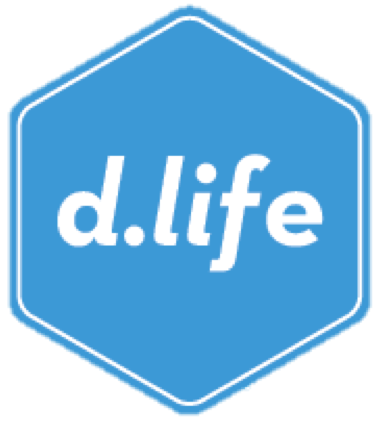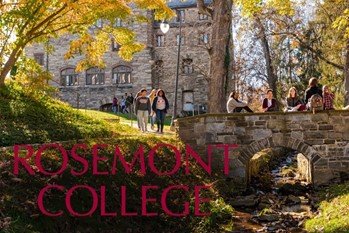Rosemont’s Business Program Seniors Prototype Using Designing Your Life to Develop Their Capstone Projects
Resulting in Graduates Sharing Unique Stories and Building Stronger Network Relationships
While They Demonstrate a Commitment to Lifelong Learning
“Prototyping: I found this to be the most crucial and fun part because I started running my life as an experiment to find out the things that I enjoy and the things that can stay as a lifestyle.”
-- Alumnus from spring 2019 class, comment received October 2021.
Tell Your Story
As Dave Evans succinctly coined, the design thinking process is quite simply “get curious, talk to people, try stuff, and tell your story.” In the business program at Rosemont College, a small liberal arts Catholic college outside Philadelphia, we dared to consider the thought exercise: “What if we use this as an oversimplified motto of the learning objectives of higher education?”
If so, we hypothesize that by applying the design thinking process and mindsets beyond the Designing Your Life (DYL) curriculum, we can thoughtfully mold our senior capstone requirement so that it strategically exhibits our students’ personal learning objectives within the context of the goals and learning objectives of their business and accounting core curricula.
Using this hypothesis, we set the goal to redesign the required BUS490 Senior Seminar for Accounting and Business Majors so that each student’s final capstone project becomes meaningful and relevant to them individually as the starting prototype of their post-graduate career, instead of acting solely as a final report on their academic prowess.
This thought exercise, while audacious, aligns with Rosemont College’s mission: We see ourselves as a community of lifelong learners dedicated to academic excellence and fostering joy in the pursuit of knowledge. We trust in and have reverence for the dignity of each person, and we value building and celebrating a diverse and intercultural community. Our school’s marketing slogan is “The Power of Small” so that we can give the attention each student deserves while we meet them where they are and share in the ‘teach a man to fish’ philosophy of our liberal arts program of critical thinking.
The business program’s senior capstone class community models our mission and values as we assemble students with robust personal perspectives from varied backgrounds who have studied separately in six distinct majors including accounting, management, international business, finance, marketing, and sports management, and who each plan to venture into unique, personally motivated career paths. Quite naturally, BUS490 Senior Seminar celebrates individuals coming together, using our rich, diverse, and unique perspectives to support each other in the hard work and personal dedication to lifelong learning that each student exhibits within our fields of passion. Our “Power of Small” exists through our ability to embrace our community and to listen and be heard as we come together and share original stories from unique paths towards distinctive, meaningful livelihoods.
As each senior capstone project tells the story of a student’s unique lifetime academic achievement as the prototype (and the beginning) of their new personal career quest, we reflect on why we share stories in the first place.
Telling our stories helps us find and grow the community of people who champion, develop, and build the ideas that we hold dear.
Telling our stories helps us build our own cognitive resonance as a liquid courage to remove self-doubt, to validate the futures in which we believe and in which we invest our time thereby bolstering us as we continue to develop our ideas.
It helps us practice the highest level of knowledge from Bloom’s Taxonomy: the adaption of learned concepts toward the creation of new ideas and solutions.
And, equally, it allows us to develop an authentic and credible personal brand that helps us build our voice and our trustworthiness within the new community that we as young business professionals admire: those who seek to solve the same problems that we do and those that we wish to serve as customers, employees, etc.
The senior capstone is a unique academic opportunity to share stories of life experience and accomplishment while exploring new paths of innovation. It is a forum with the substrate to network students in the business program internally before they embark on their individual paths. It is also an opportunity to establish and nurture connections with leaders beyond the Rosemont campus who provide value, impact, and blossoming mentorship in the students’ post-graduate endeavors.
Start Where We Are
Container: Rosemont is a small Catholic liberal arts college that is mission driven and strongly values the “Power of Small” in collaboration and community, service to one another. The DYL class format shifts the classroom space, moving furniture, creating movement very much in contrast to traditional forward-facing tables usually dictate a hierarchical flow of information.
Community: All students at Rosemont are required to complete a senior capstone for their graduation requirement. Each major department hosts the senior capstones as a 400-level 3- credit required course. In a unique challenge, the business and accounting department bring together 6 majors where students may have studied fields that don’t overlap. Student networks of majors may know each other very well while the community, as a whole, may feel fragmented, shy and may have complimentary academic skill sets (i.e., accounting vs. marketing majors). We build a safe space and a community from the start. The warm-up activity of the 10-year reunion helps students see future relationships where they are often framing graduation as severing them.
Context: A capstone project is traditionally a “completion marker” that defends a student’s right to achieve a diploma by having mastered the required learning objectives of that student’s chosen field of study. The business department at Rosemont saw the redesign of the capstone course as a challenge to flip the context from this traditional one to “What if the capstone is the beginning of a career that overlays on top of the learning from their academic pursuit?” Then, the capstone course becomes a nurturing container where students can prototype and test where “the beginning meets the end” while having the safe space and community of faculty within our mission and commitment to the “Power of Small” to test boundaries and self- actualization.
Conversation: Fluid 360-degree conversation for the redesign of this course took place between the professor, the department coordinator, a Teagle Foundation awarded Southeastern Pennsylvania Consortium for Higher Education (SEPCHE) grant workshop group, the career development office, as well as students within and after the course.
Conversations included many topics including prototyping, the alignment of the course objectives to the business department objectives to the mission statement of the college to the masteries sought by the job market, to the expectations and aspirations of students as lifelong learners.
Process: The senior seminar course redesign now flows from an accelerated 2-3 week Designing Your Life (DYL) program kick-off using The Designing Your Life book to have each student create an Odyssey plan from which they propose to design a prototype as their final capstone projects. The remainder of the course acts as the routine and support for student prototype design builds where students work independently on their project and come together to collaborate, support each other, and share stories of success and setbacks in the prototyping process that is their capstone projects.
Key Results
Why we tell our story matters more than how: Originally, we encouraged students to publish their senior capstone projects in LinkedIn, as articles or posts. Using LinkedIn allows students to explore this valuable channel for telling their story, building engagement, networks, career/personal brand authenticity, and credibility as an emerging expert/storyteller. Many young college students don’t understand the compound interest effect of networking and social capital wealth.
However, as students currently struggle with the emotional toll of the COVID-19 pandemic, I have not pushed publishing on LinkedIn as a requirement. Instead, we talk about how we tell our story, who is our ideal target audience, and how we feel most psychologically safe in choosing who, how, when. Many students over the last two sessions used their senior capstone project to develop mentor relationships within their chosen industry and shared the culminating work as ongoing conversation that helps develop authentic and sincere relationships. While LinkedIn provides breadth in reaching audience, when students prefer more intimate types of storytelling, these connections are deep, and the lasting relationships are profound.
Alumni Student Feedback:
“Prototyping- I found this to be the most crucial and fun part because I started running my life as an experiment to find out the things that I enjoy and the things that can stay as a lifestyle. One example was wanting to see what would happen if I joined a hackathon, and then that led to how far can I go with this idea? Then that led to me finding out that I suck at communicating, and I have developed a sense of low confidence. So, I joined a Dale Carnegie Training Course, and it was one of the best choices I’ve ever made. I learned from people with different backgrounds in life, and most importantly, I found out that my issue was self-confidence and not communication.” -- Graduated student from spring 2019 class, comment received October 2021.
“It’s changed the way I approached obstacles in my life. I used to only focus on the bigger picture but often times found myself overwhelmed with just thinking how to start because I can’t visualize it. So, something I started to implement into my life after the course is using a mind map when facing obstacles to help me think clearer. From there that lead to breaking things down to the simplest form and asking the simple questions.” -- Graduated student from spring 2019 class, comment received October 2021.
“Man, the project at the time was not an easy task to get done but looking back now I do find myself looking to the foundation of the ideas and goals I created for myself. I think if you have the right mindset and approach to this project, it can really help you down the line, when things may get a little bumpy and you need something to ground yourself back into your vision. Definitely was one of the most useful things I got out of my final year in college and really helps and challenges you to get out of your comfort zone and help shape the future you want to create!” -- Graduated student from spring 2019 class, comment received December 2021.
Senior Krista Eisenhardt Launches Event Planning Business, RoCo Magazine, June 2020. This article shares the story of a student’s capstone prototype pivot due to the COVID-19 pandemic. “Through this project, Krista had to experience all the elements of event planning including pricing, researching, order changes, unexpected new information, budgeting, collaborating, creating, procuring, planning and more. This was a totally relevant, practical, hands-on learning experience like no other we could have dreamed up for Krista.” said Christine Hagedorn, Assistant Professor and Business Department Discipline Coordinator.
For More Information, please contact:
Jennifer Zoga, Adjunct Professor and Instructor of Record for BUS490 Senior Seminar for Business and Accounting Majors, jennifer.zoga@rosemont.edu
Christine Hagedorn, Assistant Professor and Business Department Coordinator, christine.hagedorn@rosemont.edu

